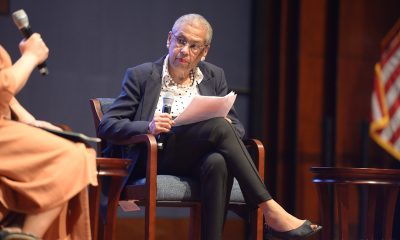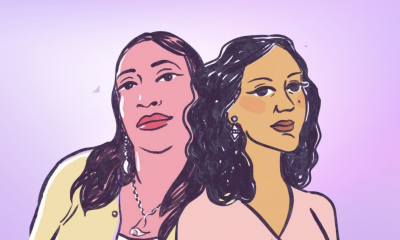Arts & Entertainment
This studly two-Dad family is storming America
Direct from Austria – and with a German TV crew in tow – these lovable daddy influencers are our hottest new imports

Just a year and a half ago, handsome Vienna-based couple Mike and Sebastian Hilscher posted their first video to YouTube, a touching highlight reel of their recent Bora Bora wedding featuring their adorable young daughter Mia. Originally just meant for family and friends, the video’s picture-perfect beach backdrop, the guys’ own movie star good looks, and their powerful and palpable love for each other and their daughter helped the clip go viral – and a pair of daddy influencers was born.
That wedding video has now been viewed nearly a quarter of a million times, and it spawned a collection of some 60 Mike and Sebastian videos and counting on YouTube alone – not to mention their rapidly growing Instagram presence – in which the guys’ sparkling personalities and frank honesty about themselves, their relationship, and the trials and triumphs of double-dad parenthood are helping them take social media by storm.
Now the guys and Mia are set to launch their next chapter as the latest residents of Southern California, settling in the gay-friendly enclave of Palm Desert. Following them along for the journey will be a German film crew from the popular German TV show Goodbye Deutschland!, which for 15 seasons has told the real-life stories of expats from German-speaking countries to all points around the globe.
So why California? “It was always clear to us that it had to be California,” says Mike, the taller of the hunky two papas, unless you count Sebastian’s voluminous hair. “We just love this state. Coming from Austria, where two-dad families are viewed skeptically and gay acceptance is questionable, it’s just relaxing for us to live in an environment where we’re not the oddballs.”
Their original plan was actually to become Angelenos. “We had even already chosen an apartment, but then we noticed that Los Angeles might not be so family-friendly,” Mike shares. “When we happened upon the Palm Springs area and looked it over, we fell in love immediately. There is no better place for us. We are absolute fans.”
While the guys are naturally excited about the prospect of growing their social media presence from their new U.S. home base, there’s much more behind their emigration story – including first and foremost, hopefully a new sibling for Mia. “The main reason we are coming to America is that we’re planning our second baby by surrogacy and want to be part of the pregnancy,” explains Mike. “Our surrogate lives in Florida, so we’ll commute regularly to visit her. We know stories of parents who couldn’t pick up their baby due to travel restrictions during COVID and we didn’t want to take that risk either, which is why we’re coming to the USA. What began with this thought has matured into an emigration plan.”
Fittingly enough on several fronts, Mike and Sebastian met at a pre-party for Vienna’s famous Love Ball in 2015. It was just before Mia’s birth (also through surrogacy), and Mike had long planned on being a single father to her. As he shared in one of the couple’s videos, Mike went into the Love Ball thinking it would be his last big party night before fatherhood. ” I was so looking forward to being a dad, but this one last time I wanted to go crazy, he says.” Instead, he wound up meeting Sebastian that night, and by the time Mia was born three or for weeks later, they were a couple. They’ve been a two-dad family ever since.
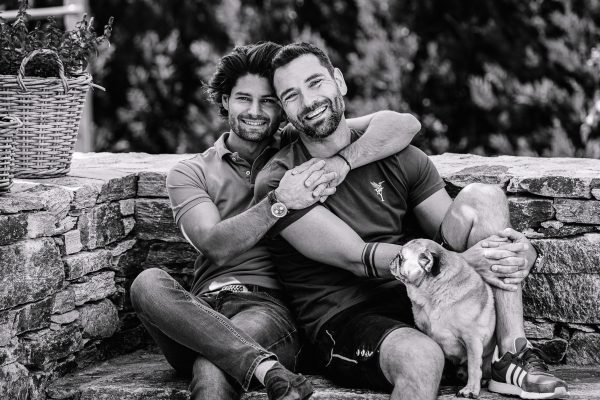
“We have a very strong vision that got us into social media in the first place,” Mike explains. “Our vision is to normalize two-dad families, and we believe this is only possible through visibility. In the last few months, our social media channels have grown so much that it’s now a full-time job to look after them.”
Mike especially likes that he’s been able to utilize his experience as a psychological consultant with some of their followers. “I bring my expertise to individual consultations, especially in the area of family planning for LGBT couples, and also advice for LGBT young people in dealing with their sexuality and finding their identity. I have at least two to three consultations a week, free of charge of course.”
Consulting is just one of Mike’s many successful and varied career chapters. In the early 2000s, when he was in his early 20s, Mike sang in a popular Austrian pop band called Sugar Free, and even won an Amadeus Award, the country’s top music prize. He later went on to pass the bar exam and run a successful facility management company, and he also wrote a best-selling children’s book.
For his part, Sebastian is hardly a slacker. At just 24, he won a major national competition with his innovative concept for transforming democracy into the digital age. He pumped the $150,000 prize money into the highly successful construction business that he still runs – he’ll return to Austria periodically to that company flowing, and he’ll meanwhile be introducing its products to the American market.
“Sebastian will continue to do his company, but I will concentrate full-time on our work in the social media area,” says Mike. “We’ve been fully committed to driving the success of our social media. It’s our declared goal to become one of the big players in this area in order to be able to change something for the better.”
After the craziness of packing up their lives in Austria, the young family won’t be slowing down any time soon – the first weeks of their California schedule are already jampacked. “We will first be busy shooting the TV show, then our own cameraman will come with us to produce some episodes for our YouTube,” says Mike. “Of course we have Mia’s first day of school, moving into the house, buying a car, moving into the new office, etc. We’re also looking for our infrastructure, meaning gym, a dance center for Mia, and so on. Then we also have the jet lag, and Mia has to study English as well learn the German curriculum. So we certainly won’t get bored.”
Movies
‘Pillion’ director on bikers, BDSM, and importance of being seen
‘We put a lot of thought and effort into how we depicted the community’

One of the highlights of last week’s Mid-Atlantic Leather Weekend came not on the dance floor, but in a movie theater. In a new partnership, the independent film studio A24 brought its leather-clad new film “Pillion” — not yet in wide release — to D.C. for special showings for the MAL crowd.
“Pillion,” a term for the motorcycle passenger seated behind the driver, delves into the complicated relationship between an introverted, quiet Londoner Colin (Harry Melling) who embarks on a journey finding himself while entering into a sub relationship with a new Dom named Ray (Alexander Skarsgård) he meets during Christmas.
It’s writer-director Harry Lighton’s feature-length debut, sharing Skarsgård’s impossibly toned physique with both Colin and audiences, and offering an eye into the BDSM community by an LGBTQ director for the general public. This from a studio that also just released a movie about ping-pong starring Timothée Chalamet.
The Washington Blade was able to catch a screening at Regal Gallery Place on Jan. 18, hosted by MAL and Gary Wasdin, executive director, Leather Archives & Museum. The Blade also had a chance to interview Lighton about the experience.
Blade: How did you get involved in this film, especially as this is your directorial debut?
Lighton: I was sent “Box Hill,” the novel on which “Pillion” is based, by Eva Yates (the head of film at the BBC). I’d spent years working on a sumo film set in Japan, and then suddenly that became impossible due to the pandemic so I was miserable. And then I read this book that I found bracing, funny, moving. All the good things.
Blade: Are you involved with the leather community? Did you draw on any personal experiences or make connections with the community?
Lighton: I’m involved in the wrestling scene but not the leather community. So I spent lots of time with people who are [in the community] during the writing process, and then ended up casting a bunch of them as bikers and pillions in the film. They were incredibly generous to myself, Harry, and Alex with their knowledge and experiences. We have them to thank for lending credibility to the world on screen.
Blade: What kind of reception have you received at film festivals and with the LGBTQ community? Was it what you imagined?
Lighton: Obviously not everyone’s going to like the film — for some people it’ll be too explicit, for some not explicit enough; some people will feel seen, some won’t. But the general reaction’s been extremely positive so far. If I’m honest I thought it would divide opinion more.
Blade: How was it working with the actors?
Lighton: I had a lot of respect for both of them going in, and wondered if that might make me a bit too deferential, a bit too Colin-coded. But besides being extremely talented, they’re both lovely. And committed. And fun! With my shorts I always felt a bit out of my depth working with actors, but here I discovered a real love for it.
Blade: Turning to the plot, the parents are pretty supportive, especially Colin’s dad. How did you decide to draw his parents? What does it mean to show parents with nuanced viewpoints?
Lighton: I wanted to reverse the typical parent-child dynamic in queer film, where parents go from rejecting to accepting their queer kid. We meet Colin’s parents actively pushing him toward a gay relationship. But when the relationship he lands on doesn’t meet her definition of healthy, his mum withdraws her acceptance. I wanted to ask: Are they projecting their romantic model onto their son, or do they have a legitimate concern for his wellbeing with Ray?
Blade: How did you decide to place the setting?
Lighton: Practically, we needed somewhere within reach of London. But I liked the idea that Colin, who lives life on the periphery, grew up on the edge of the capital. One of our producers, Lee Groombridge, grew up in and around Bromley and showed me all the spots. I loved the atmosphere on the high street, the markets, and the contrast between the high street and the idyllic park. And I thought it would be a funny place for Alexander Skarsgård to have settled.
Blade: What do you hope audiences take away from the film?
Lighton: There’s no one message. Different people will take different things from it. Personally, Colin inspires me to jump off cliffs, to push beyond my comfort zone because that’s where life begins. From Ray I get the courage to be ugly, to fly in the face of social convention if it doesn’t make you happy or it’s not built for you.
Blade: Talk about the soundtrack — especially the Tiffany “I Think We’re Alone Now” song.
Lighton: Skarsgård’s Ray has the surface masc-ness that comes with looking like a Viking. I wanted to combine that with details that indicate he’s been a part of gay culture and “I Think We’re Alone Now” is nothing if not a camp classic.
Blade: What does it mean to you to show the film at MAL?
Lighton: When I told the bikers from the film I was coming to MAL they practically wet themselves with excitement. We put a lot of thought and effort into how we depicted the community in the film and there’s so much variety, no two Masters or subs are the same, but seeing a theater full of men in leather laugh, cry, and clap for the film meant the world.
a&e features
Alexander Skarsgård describes ‘Pillion’ in 3 words: lube, sweat, leather
Highly anticipated film a refreshingly loving look at Dom-sub life

Whether you’ve seen him in popular HBO series like “True Blood,” “Succession,” and “Big Little Lies,” the dynamic Swedish actor Alexander Skarsgård has that smoldering gaze that immediately draws viewers in.
Following in the footsteps of his father Stellan, (who just won the Golden Globe for “Sentimental Value”) the Golden Globe, Emmy, and SAG winner Skarsgård continues to be an actor who is fearless in the roles he takes on.
That courageousness is evident in Skarsgård’s latest film, the BDSM black comedy “Pillion,”which he also executive produces. He plays Ray, the handsome, hyper-dominant leader of a gay bike gang. The film was written and directed by Harry Lighton, and is based on the 2020 novel “Box Hill,” by Adam Mars-Jones.
“This was a small film by a first time filmmaker and it wasn’t financed when I read it,” Skarsgård told journalists at a recent awards news conference. “And I felt that, if I could help in any small way of getting it financed, I wanted to, because I thought it was such an incredible screenplay and I believe in Harry Lighton so much as a filmmaker. And it felt tonally unlike anything I’d ever read. It was such an exciting, surprising read.”
Skarsgård was blown away by the quality of the unconventional script. “When I heard BDSM relationship, biker culture, I expected something very different. I didn’t expect it to have so much sweetness and tenderness and awkwardness.”
For the sex scenes and nudity with co-star, Harry Melling — who excels in his portrayal as Ray’s submissive Colin — Skarsgård talked very early on with Lighton about how he wanted to shoot those scenes, and why they were in the film.
“I often find sex scenes quite boring in movies because a lot of the tension is in the drama leading up to two people hooking up, or several people hooking up, as in our movie. But what I really enjoyed about these scenes — they are all pivotal moments in Colin’s journey and his development. It’s the first time he gets a blowjob. It’s the first time he has sex. It’s the first time he has an orgasm. And these are pivotal moments for him, so they mean a lot. And that made those scenes impactful and important.”
Skarsgård was happy that Lighton’s script didn’t have gratuitous scenes that shock for the sake of just shocking. “I really appreciated that because I find that when this subculture is portrayed, it’s often dangerous and crazy and wild and something like transgressive.”
He continued: “I really love that Harry wanted it to feel real. It can be sexy and intense, but also quite loving and sweet. And you can have an orgy in the woods, rub up against a Sunday roast with the family. And that kind of feels real.”
One of the obstacles Skarsgård had to work with was Ray’s emotionally distant personality.
“Ray is so enigmatic throughout the film and you obviously never find out anything about him, his past. He doesn’t reveal much. He doesn’t expose himself. And that was a challenge to try to make the character interesting, because that could easily feel quite flat…That was something that I thought quite a lot about in pre production…there are no big dramatic shifts in his arc.”
For the film, Lighton consulted the GMBCC, the UK’s largest LGBT+ biker club, attending their annual meetup at which 80 riders were present.
“Working with these guys was extraordinary and it brought so much texture and richness to the film to have them present,” said Skarsgård. “They were incredibly sweet and guiding with us — I can’t imagine making this movie without them. I’d go on a road trip with them anytime.”
Added Skarsgård: “To sum up ‘Pillion’ in three words: lube, sweat, and leather. I hope people will connect with Colin and his journey, and come to understand the nuance and complexity of his bond with Ray.”
This year is shaping up to be a busy one for Skarsgård. “Pillion” premieres in select cities on Feb. 6 and then moves into wide release on Feb. 20. After that for Skarsgård is a role in queer ally Charli XCX’s mockumentary, “The Moment,” which premieres at the Sundance Film Festival. HIs sci-fi comedy series, Apple TV’s “Murderbot,” which he also executive produces, will begin filming its second season. And this weekend, he hosts “Saturday Night Live.”
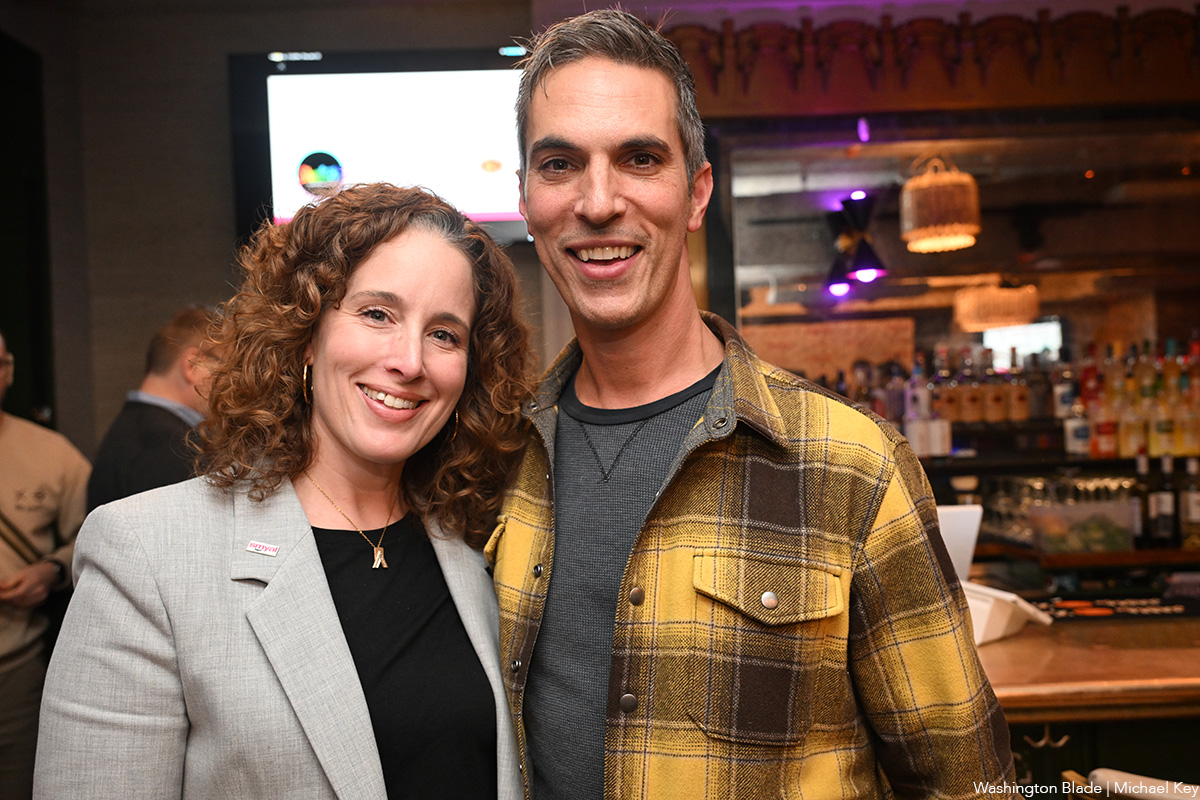
The LGBTQ youth services organization SMYAL held its annual fundraiser, ‘SMYAL for the New Year,’ at Shakiki (2012 9th Street, N.W.) on Thursday, Jan. 22.
(Washington Blade photos by Michael Key)
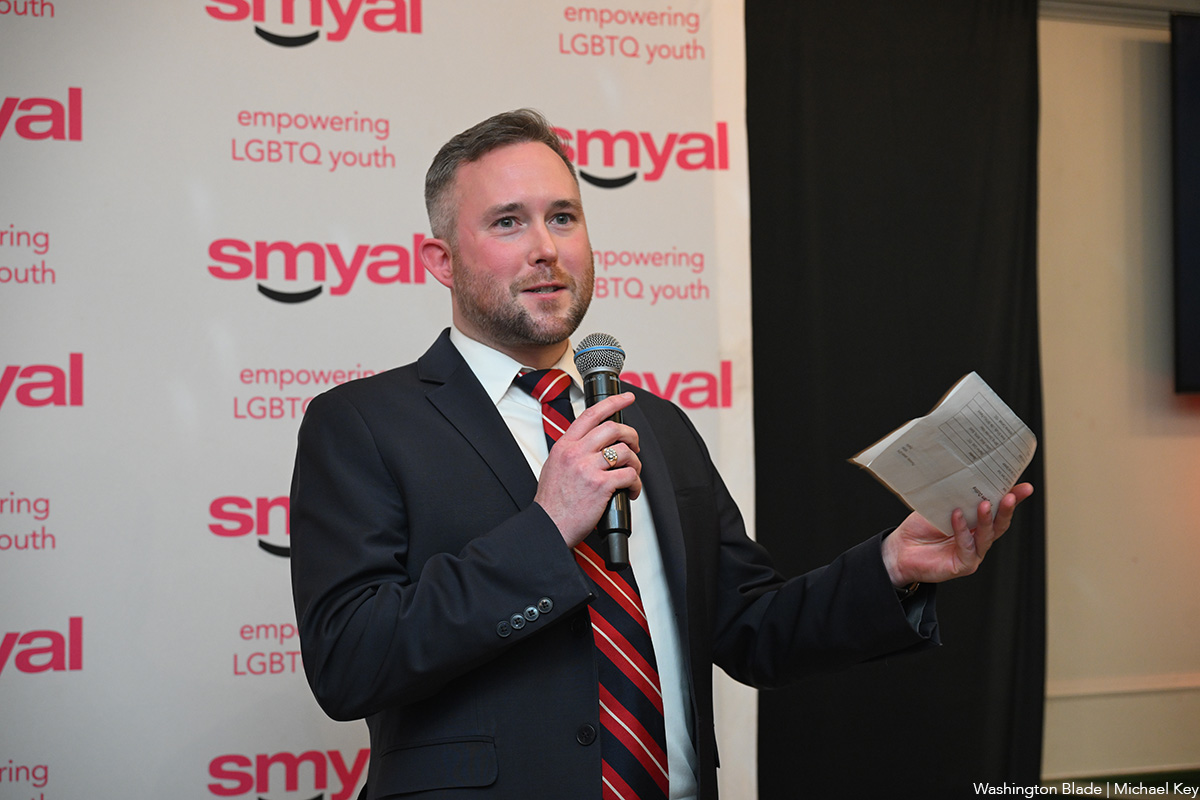
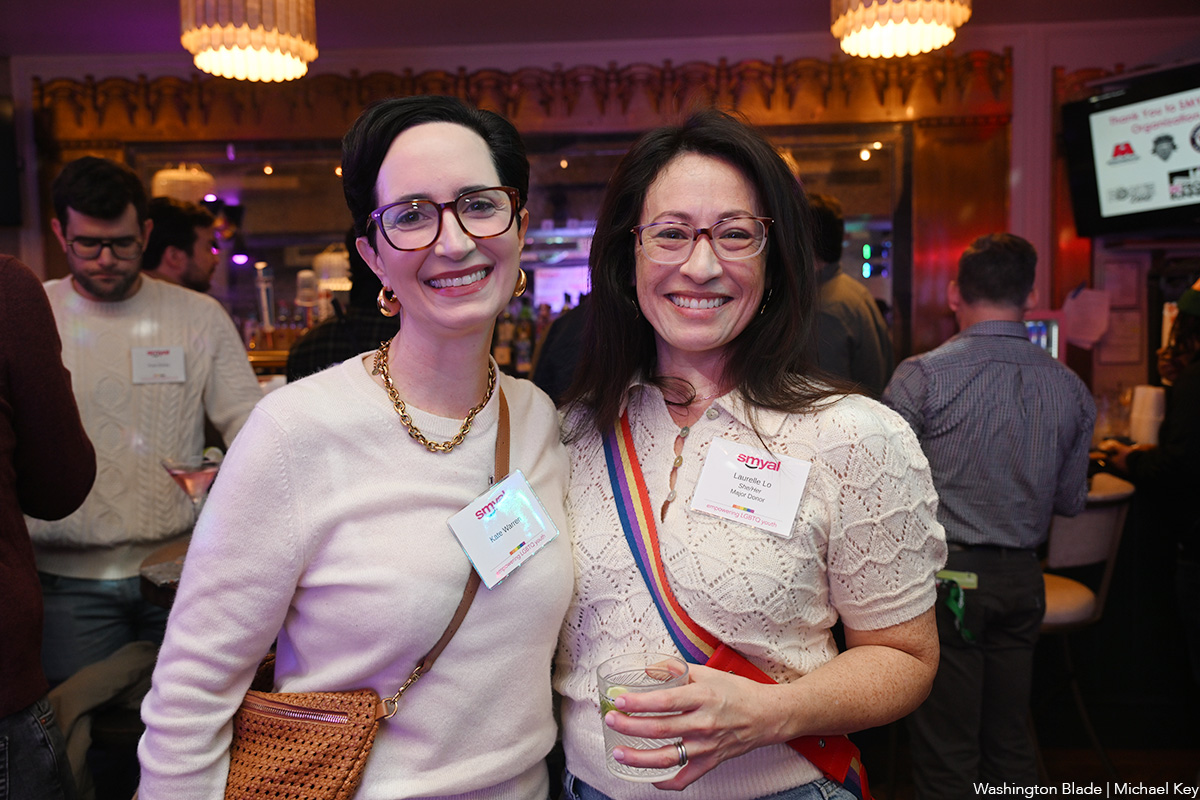
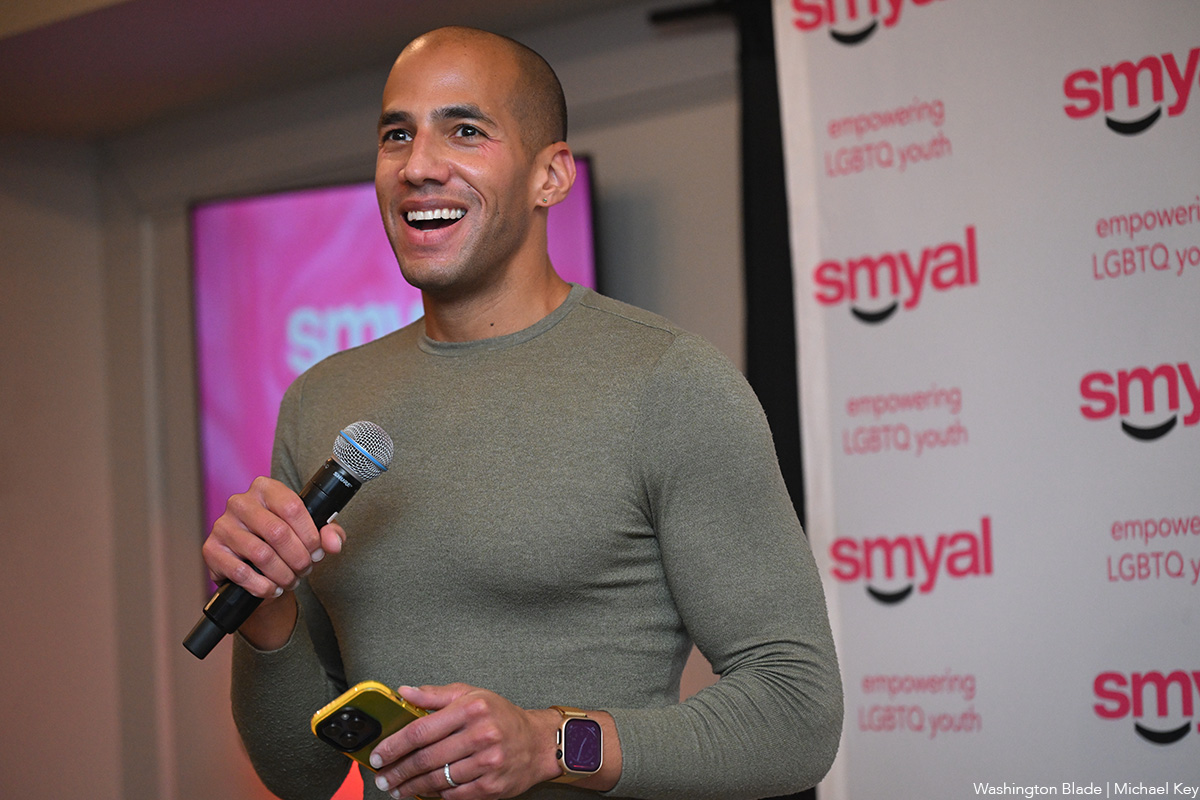
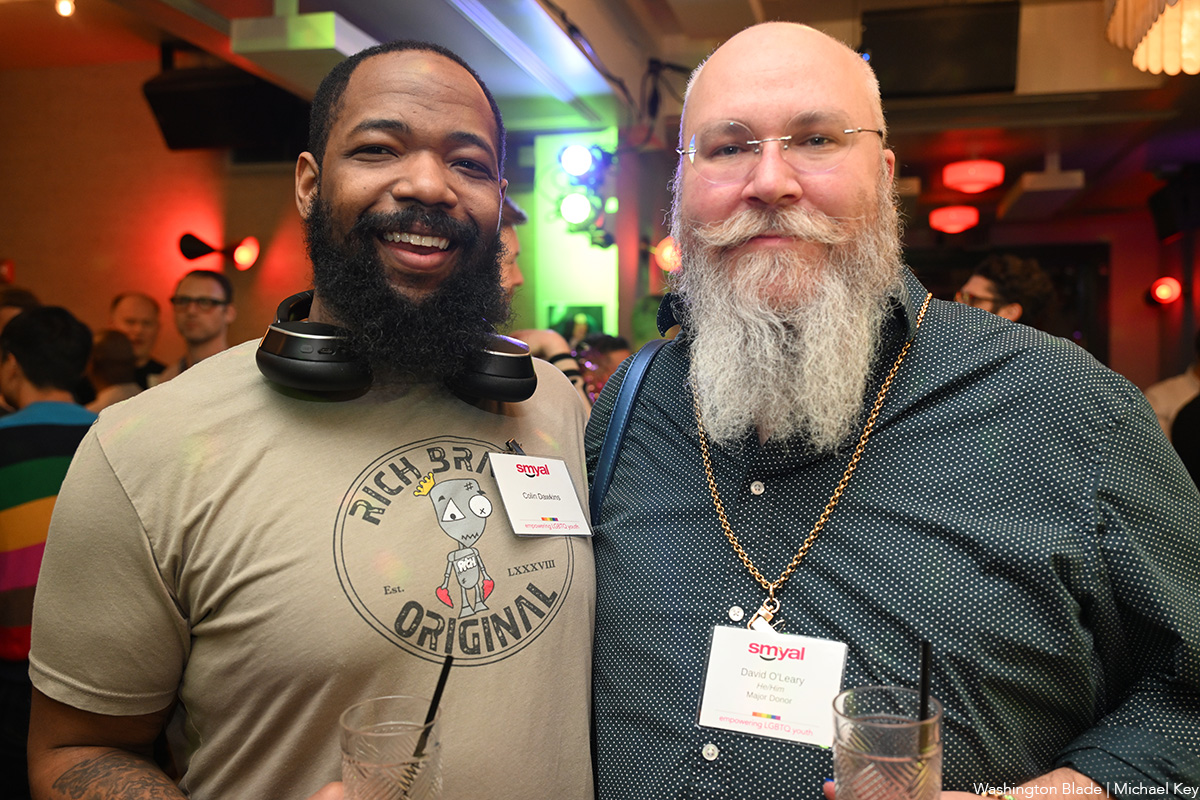
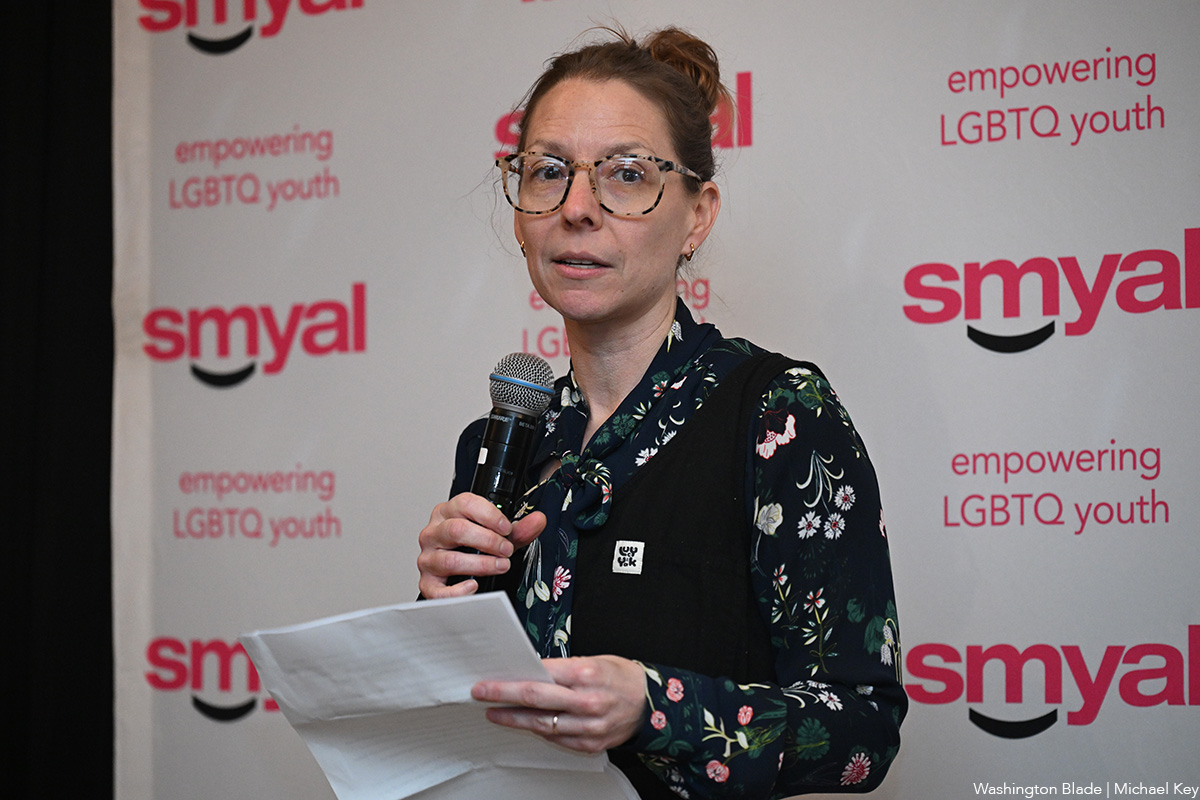
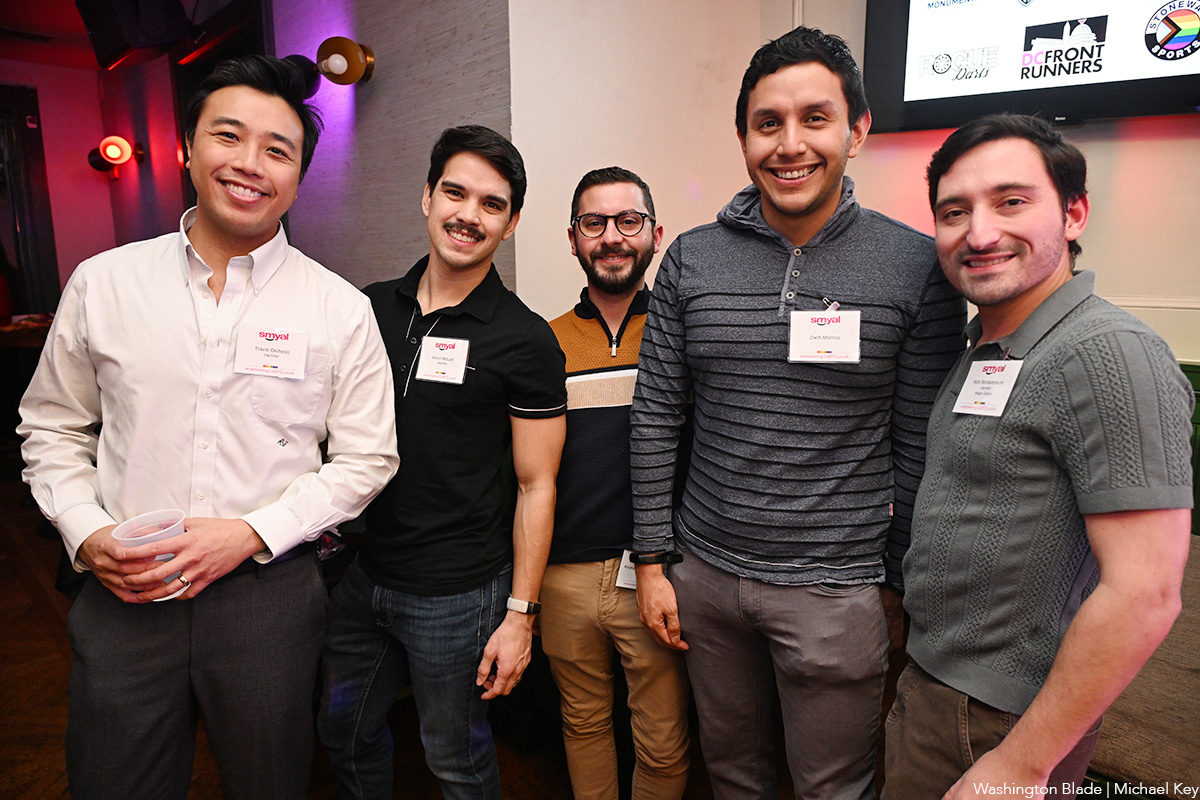
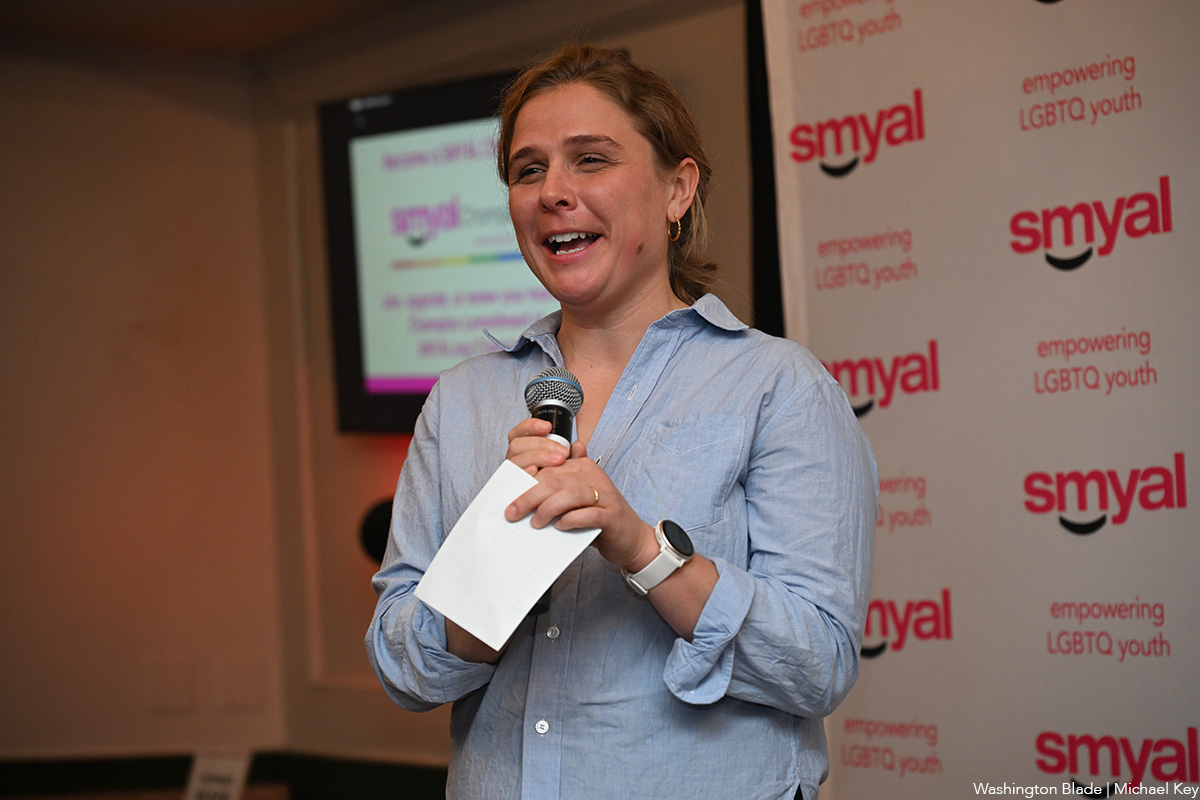
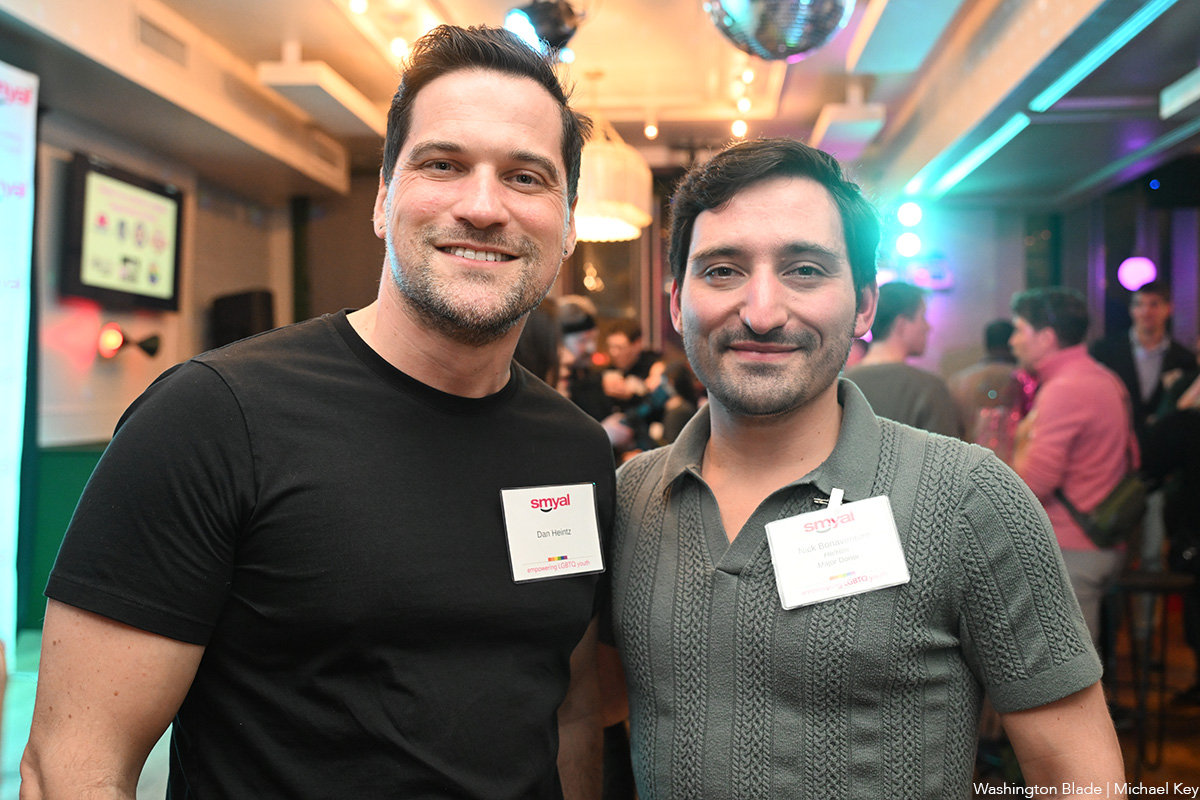
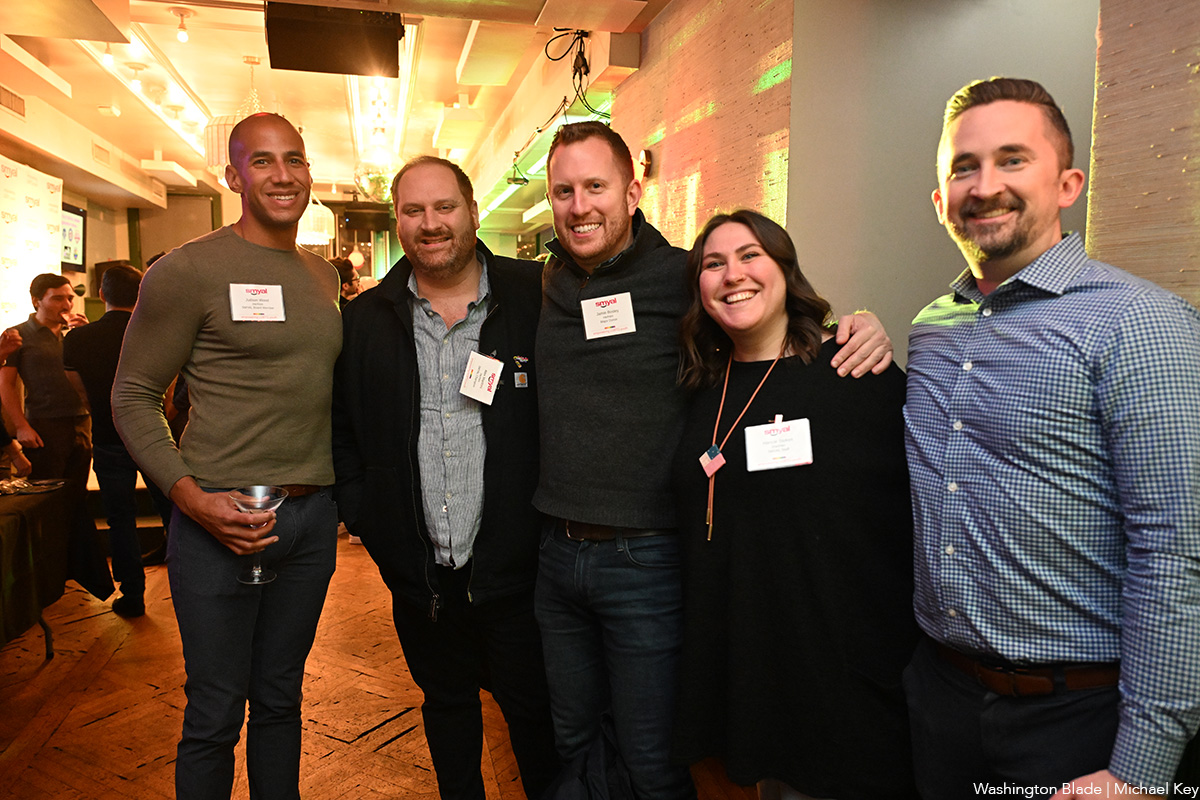
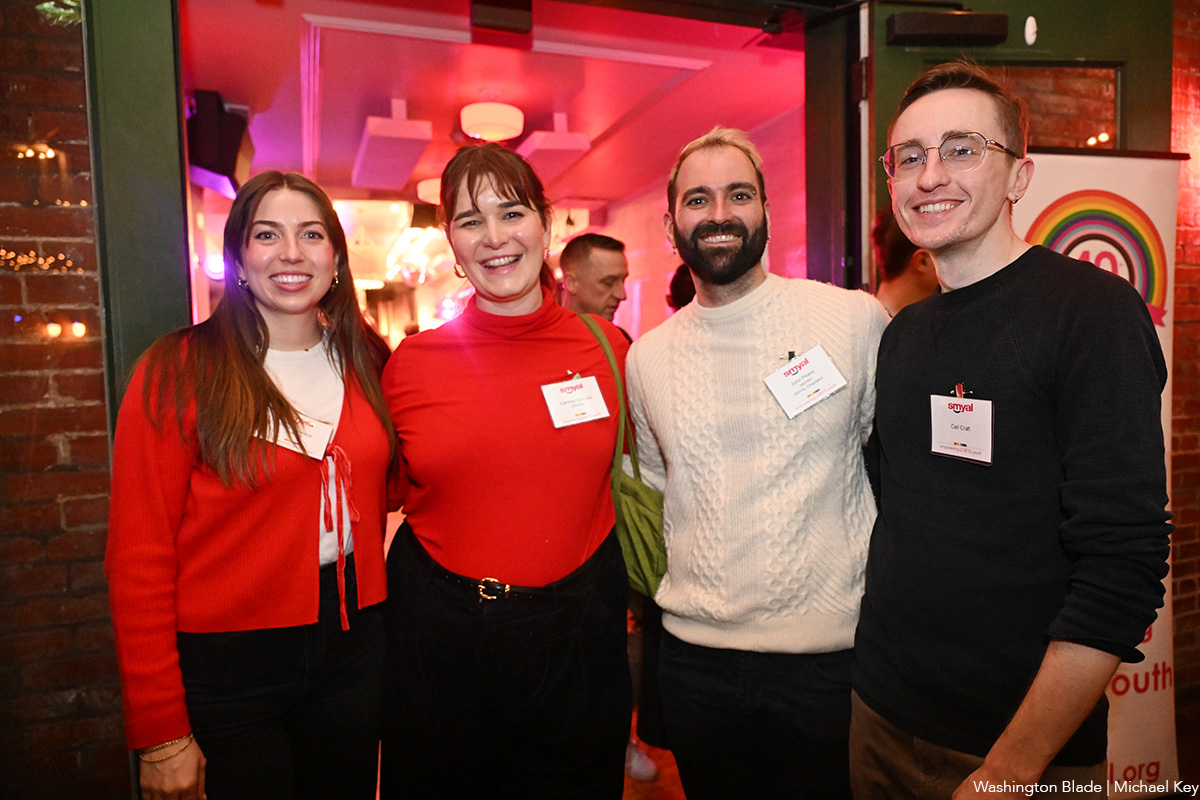
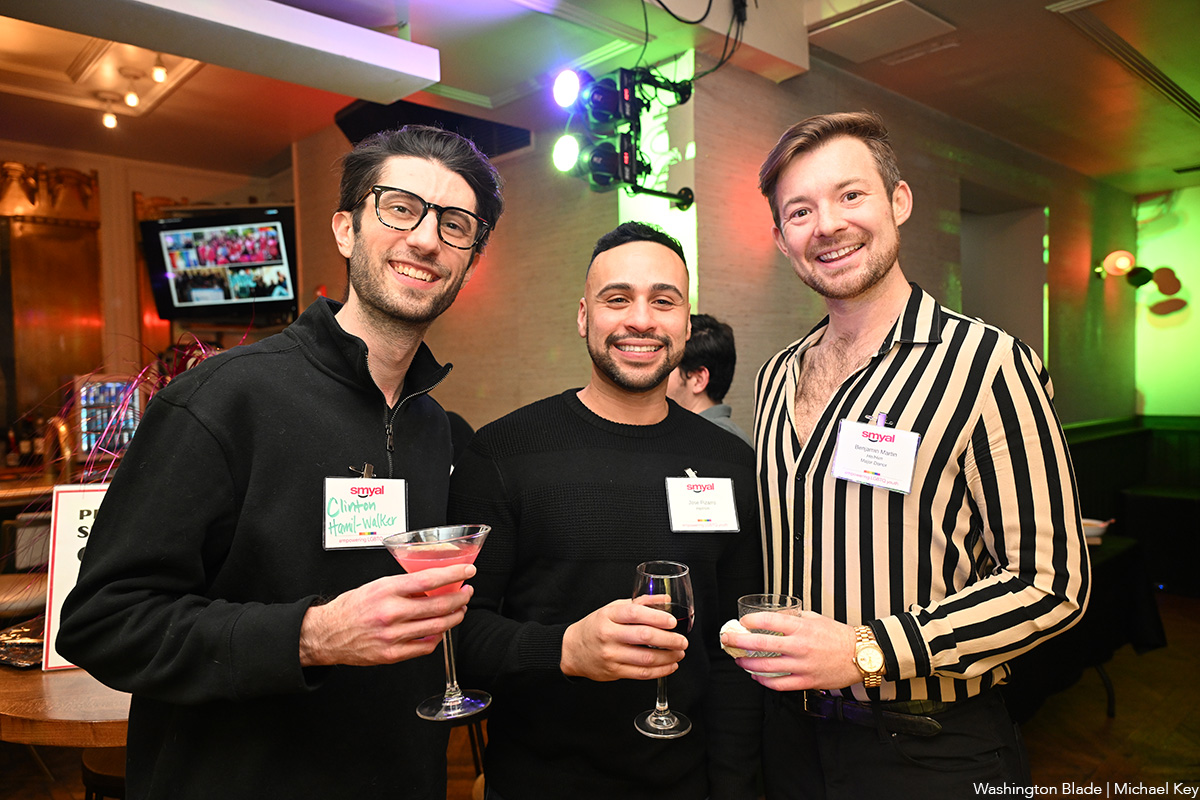
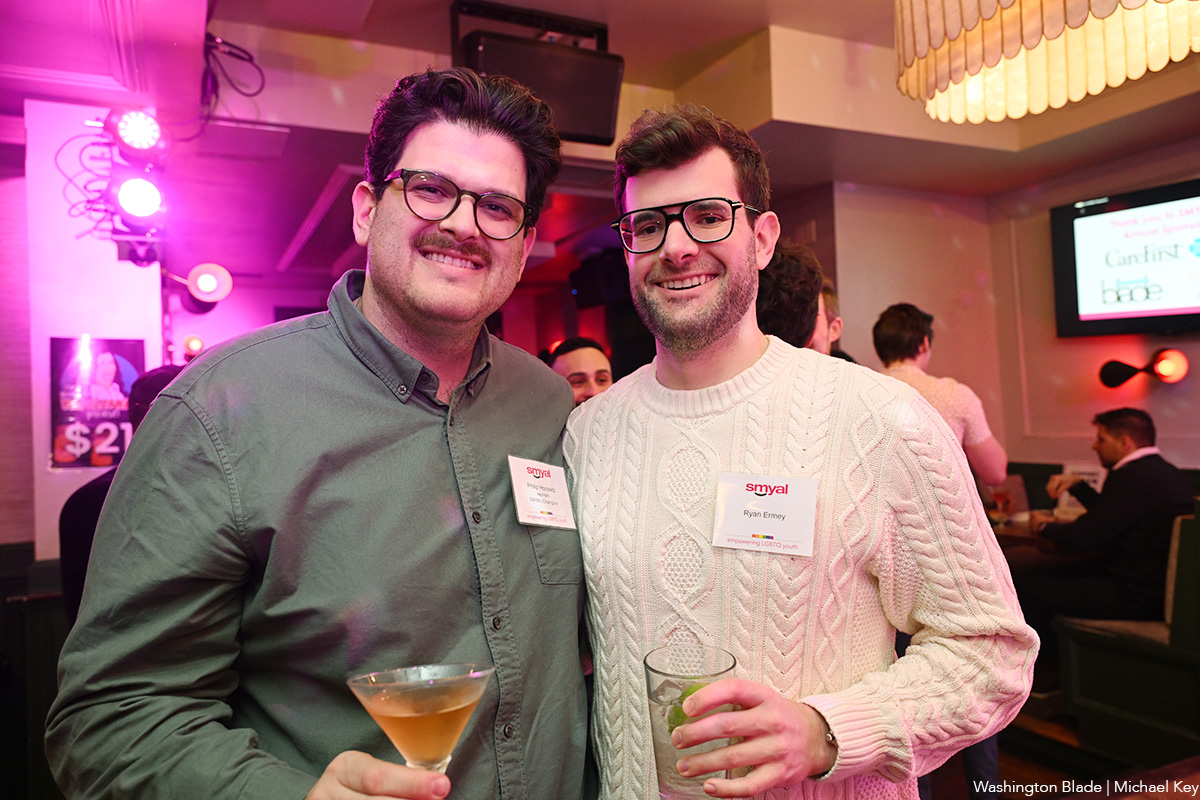
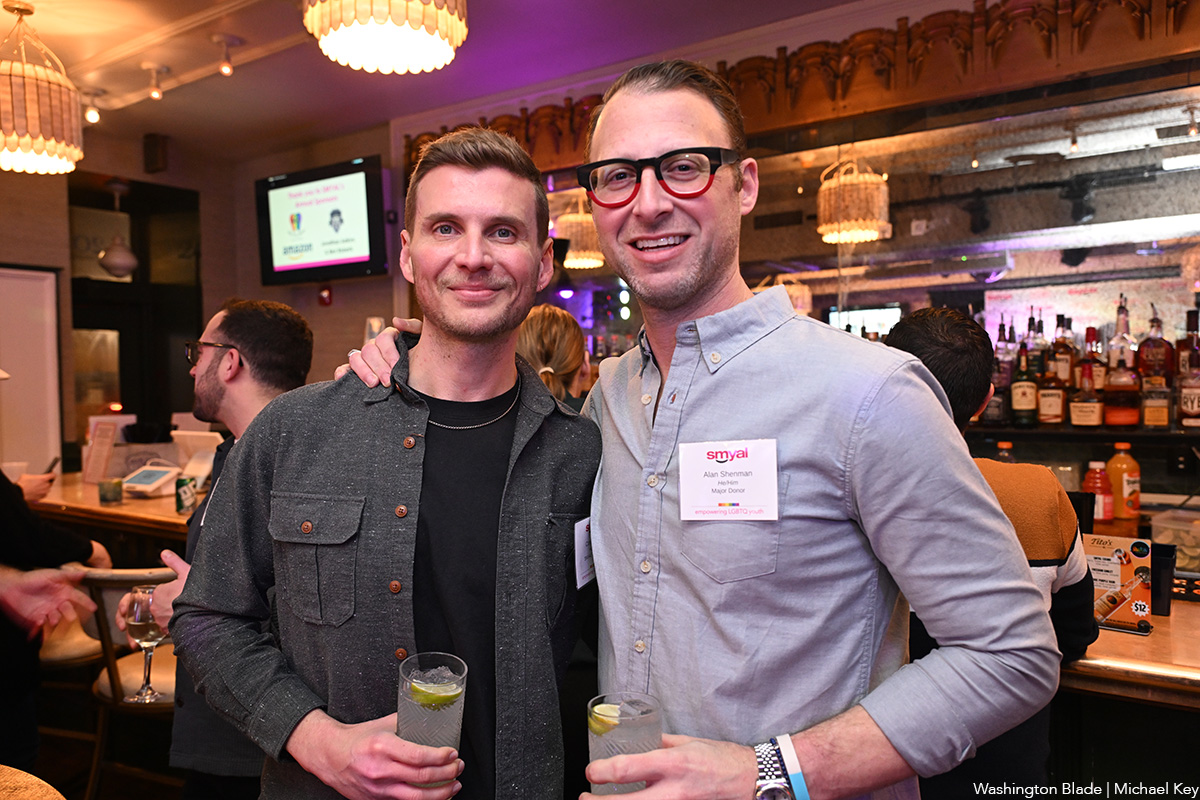
-

 Real Estate4 days ago
Real Estate4 days agoConvert rent check into an automatic investment, Marjorie!
-

 Theater4 days ago
Theater4 days agoSwing actor Thomas Netter covers five principal parts in ‘Clue’
-

 District of Columbia3 days ago
District of Columbia3 days agoEleanor Holmes Norton ends 2026 reelection campaign
-

 Honduras3 days ago
Honduras3 days agoCorte IDH reconoce a Thalía Rodríguez como familia social de Leonela Zelaya













